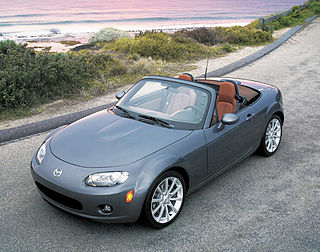
Oldsmobile was a brand of American automobiles, produced for most of its existence by General Motors. Originally established as "Olds Motor Vehicle Company" by Ransom E. Olds in 1897, it produced over 35 million vehicles, including at least 14 million built at its Lansing, Michigan factory alone.

A convertible or cabriolet is a passenger car that can be driven with or without a roof in place. The methods of retracting and storing the roof vary among eras and manufacturers.

Personal luxury car is a North American car classification describing somewhat sporty, sophisticated mass-market coupés that emphasized comfort over performance. The North American manufacturers most often combined engineering, design, and marketing to develop upscale, distinctive "platform sharing" models that became highly profitable.

William Crapo Durant was a leading pioneer of the United States automobile industry and co-founder of General Motors and Chevrolet. He created a system in which a company held multiple marques – each seemingly independent, with different automobile lines – bound under a unified corporate holding company. Durant, along with Frederic L. Smith, co-founded General Motors, as well as Chevrolet with Louis Chevrolet. He also founded Frigidaire.

The North American International Auto Show (NAIAS), also known as the Detroit Auto Show, is an annual auto show held in Detroit, Michigan, U.S., at Huntington Place. The show was held in January from 1989 to 2019. It was intended to move to the summer in 2020, but was canceled due to the COVID-19 pandemic that year and 2021, before returning in September 2022. It is among the largest auto shows in North America. UPI says the show is "regarded as the foremost venue for [car] manufacturers to unveil new products".

In the automotive industry, rebadging is a form of market segmentation used by automobile manufacturers around the world. To allow for product differentiation without designing or engineering a new model or brand, a manufacturer creates a distinct automobile by applying a new "badge" or trademark to an existing product line.

Epsilon is General Motors' mid-size front-wheel drive automobile platform. The architecture was a multi-division project of GM North America, Opel and Saab, and debuted in the 2002 Opel Vectra and 2003 Saab 9-3. Since this platform falls squarely in the center of the worldwide automobile market, GM plans to produce a great many Epsilon vehicles with over a dozen variations. As of 2005, it was GM's highest volume worldwide platform. Even after the dissolution of the GM/Fiat partnership, both companies retain the rights to continue developing Epsilon-derived models.

Full-size car—also known as large car—is a vehicle size class which originated in the United States and is used for cars larger than mid-size cars. It is the largest size class for cars. In Europe, it is known as E-segment or F-segment.

The B platform is a full-size, rear-wheel drive, body-on-frame car platform, that was produced by General Motors (GM) from 1926 to 1996. Originally made for Oldsmobile and Buick, all of General Motors's five main passenger car makes would use it at some point. It was closely related to the original rear-wheel drive C and D platforms, and was used for convertibles, hardtops, coupes, sedans, and station wagons. With approximately 12,960,000 units built, divided across four marques, the 1965–1970 B platform is the fourth best selling automobile platform in history after the Volkswagen Beetle, Ford Model T, and the Fiat 124.

The Buick Roadmaster is an automobile built by Buick from 1936 until 1942, from 1946 until 1958, and then again from 1991 until 1996. Roadmasters produced between 1936 and 1958 were built on Buick's longest non-limousine wheelbase and shared their basic structure with the entry-level Cadillac Series 65, the Buick Limited, and after 1940, the Oldsmobile 98. Between 1946 and 1957, the Roadmaster served as Buick's flagship.

Power windows or electric windows are automobile windows which can be raised and lowered by pressing a button or switch, as opposed to using a crank handle.

The General Motors Motorama was an auto show staged by GM from 1949 to 1961. These automobile extravaganzas were designed to whet public appetite and boost automobile sales with displays of fancy concept cars and other special or halo models. Motorama grew out of Alfred P. Sloan's yearly industrial luncheons at New York City's Waldorf-Astoria Hotel, beginning in 1931. They were almost invariably held in conjunction with the New York Auto Show, that for many years was held traditionally in the first week of January.

Durant Motors Inc. was established in 1921 by former General Motors CEO William "Billy" Durant following his termination by the GM board of directors and the New York bankers who financed GM.

The Los Angeles Auto Show, also known as the LA Auto Show, is an auto show held annually at the Los Angeles Convention Center in Los Angeles, California, United States. It is open to the public for ten days, filling 760,000 square feet (71,000 m2) of exhibit space. Since 2006 the event is held in November or December.

In the late 1920s, American automotive company General Motors (GM) launched four companion makes to supplement its existing lineup of five-passenger car brands, or makes. The companion makes were LaSalle, introduced for the 1927 model year to supplement Cadillac; Marquette, introduced in 1929 for 1930 to supplement Buick; Pontiac, introduced for 1926 to supplement Oakland; and Viking, introduced for 1929 to supplement Oldsmobile. GM's fifth existing brand, Chevrolet, did not receive a companion make. With the exception of Viking, each of the companion makes were slotted below their "parent make" in GM's pricing hierarchy.

Ford Motor Company introduced its De Luxe Ford line in 1938 as an upscale alternative to bridge the gap between its base model and luxury Lincoln offerings. The "Deluxe" name was first used starting in 1930 to specify an upscale trim starting with the Model 40-B and Model 45-B, then later the De Luxe Ford line was differentiated as a separate "marque within a marque" with separate styling and pricing through 1940. During 1939, Ford had five lines of cars: Ford, De Luxe Ford, Mercury, Lincoln-Zephyr, and Lincoln. After the war, this was simplified to Ford, Mercury, and Lincoln. The 1941 Ford line included "De Luxe" and "Super De Luxe" trim, but these vehicles were not marketed as a separate line. As Mercury Eight sales progressed, the De Luxe approach was cancelled.
The cars in Miami Vice mainly involve the Ferrari Daytona Spyder and the Ferrari Testarossa, but also include other automobiles driven by the characters on the show. Currently one Daytona is in a private collection and the other is on display at the Volo Auto Museum; the Ferrari Testarossa stunt car resides in Kingsport, Tennessee and is owned by Carl Roberts of Carl Roberts Motor Group. Today, one of the hero cars is part of The Witvoet collection owned by Bastiaan Witvoet in Belgium.

The Western Antique Aeroplane and Automobile Museum (WAAAM) is located in Hood River, Oregon, United States, adjacent to the Ken Jernstedt Memorial Airport. WAAAM is a nonprofit 501(c)(3) organization committed to the preservation of, and education about aviation, automobile, and other historic transportation-related relics.
This is a list of automobiles produced for the general public in the North American market. They are listed in chronological order from when each model began its model year. If a model did not have continuous production, it is listed again on the model year production resumed. Concept cars and submodels are not listed unless they are themselves notable.

The Annual LeMay Car Show began in 1978, as a small gathering with Harold and Nancy LeMay and friends. The tradition continues to this day, with over 1,000 vintage cars shown on the last Saturday of August each year, and collectors coming to see them. The yearly event is held at the LeMay Family Collection Foundation at Marymount in Tacoma, Washington, and the LeMays open up their home. This event is not just about celebrating cars, though. The staff and volunteers view this car show as a way of connecting people with history. The past few years, an auction has also been part of the car show.























